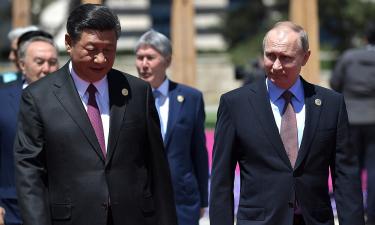Pentagon’s head falls off. Russia prepares to fight
US President Bush got rid of one of the key personas in his administration yesterday. Defense Secretary Donald Rumsfeld (74 y.o.) was dismissed from his position. The Pentagon will definitely have the new administration soon. Bush said that the decision to dismiss Rumsfeld was taken after a series of conversations with the ex-chairman of the Pentagon. Rumsfeld took the office in January of 2001, i.e. from the first days of the Bush’s first-term presidency. It is worthy of note that Bush originally intended to keep Rumsfeld in the US administration till the end of his second presidential term (January 2009 that is).

Former CIA Director Roberts Gates (63 y.o.) will take the principal position in the Pentagon. Gates is considered to be a close friend of the Bush’s clan. He chaired the US intelligence during 1991-1993. At present moment Gates chairs a university in Texas.
The new appointment in the Pentagon requires an improvement at the US Senate. Bush stated that Gates would bring more than 25 years of his experience in the field of national security once the Senate approves his candidacy. Robert Gates served for six US presidents, both Republicans and Democrats. He started as a junior employee of the CIA and evolved to the CIA director. George W. Bush claimed that Robert Gates possesses the knowledge that will let him respond to challenges the USA will have to deal with during the forthcoming two years.
It is an open secret that the US Defense Secretary had to resign over the final results of congressional elections in the USA. Democrats have taken control over the House of Representatives owing to USA’s debacle in Iraq, first and foremost. Reps have been reigning in the House of Representative since 1994.
The change of power in the USA will lead to serious consequences both to US President Bush and Russia, taking into consideration Dems’ tough position towards Russia. The head of the Committee for International Affairs of the State Duma, Konstantin Kosachev, believes that the voting results in the USA will show a negative influence on the development of the US-Russian relationship. The official believes that the end of the Republican era in the USA may complicate the process of Russia’s incorporation in the WTO. “Difficulties may arise with the cancellation of the discriminatory Jackson-Vanik amendment which hinders the development of economic relations between Moscow and Washington. If both Republicans and Bush are interested in the cooperation with Russia in terms of global security and anti-terrorist struggle, then Democrats are concentrated on human rights issues. It is not ruled out that Dems may highlight this question to the detriment of US-Russian relations.
Democratic candidate to the House of Representative in California, Tom Lantos, (78 y.o.) won 75 percent of votes. Lantos is known for his anti-Russian statements and law-making initiatives, which particularly included a requirement to exclude Russia from the prestigious Group of Eight club.
The Director of Russian and Asian Programs of Washington-based Institute of Global Security, Nikolai Zlobin, is certain that the new staff of the US Congress will run tougher policies as far as Russia is concerned. “Anti-Russian criticism in the USA has become much more conspicuous these days against the background of criticism of the US-led foreign policies, including the establishment of the strategic partnership between Russia and the USA. The majority of Americans believe that Russia has become an authoritarian state, implying that it would be possible to cooperate on the solution of certain problems only,” the expert said in an interview with the Vremya Novostei newspaper.
Democrats completed their sweep Wednesday evening by ousting Republican Senator George Allen of Virginia, the last of six Republican incumbents to lose re-election bids in a midterm election marked by deep dissatisfaction with the president and the war in Iraq. The Democrats will have 51 seats in the 100-seat Senate when Congress reconvenes in January.
Democrats had 229 seats in the House, 11 more than the number necessary to hold the barest of majorities in the 435-member chamber.
Aside from gains in Congress, Democrats took 20 of 36 governors' races to give them a majority of top state jobs - 28 - for the first time in a dozen years. New York, Ohio, Massachusetts, Colorado, Maryland and Arkansas went into the Democratic column.
Almost 79 million people voted in Tuesday's election, with Democrats drawing more support than Republicans for the first time in a midterm election since 1990.
The overall turnout rate, reflecting a percentage of voting age population, was 40.4 percent, compared with 39.7 percent in 2002, according to an Associated Press vote count and an analysis by American University's Center for the Study of the American Electorate.
Source: agencies
Translated by Dmitry Sudakov
Pravda.ru
Subscribe to Pravda.Ru Telegram channel, Facebook, RSS!





